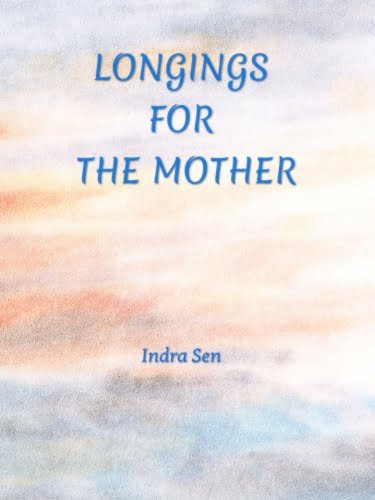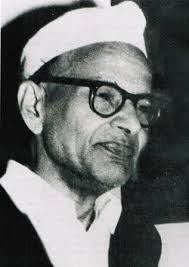Longings for the Mother by Indra Sen

Longings for the Mother
I learned of the Mother’s passing on the morning of the 18th November, 1973 at Sri Aurobindo Yoga Mandir, Jwalapur (Hardwar), where my normal work lies as given by the Mother in 1958. The impulse that arose within me was to go deep within and be with the Mother to the best of my capacity. I reduced my external preoccupations to the minimum and began to live in that manner and it was profoundly satisfying. In this experience, there were occasional moments of shock and grief too but, on the whole, there was a feeling of inner assurance and a sense of contact and conversation with the Mother. On the morning of the 27th November, as I sat in this contemplation, a move arose to concretise the inner thought and feeling and I wrote out “Our Mother, who is no more, who is ever more.” Soon all the ten topics ending with “Mother, we read again Your ‘Notes on the Way’” came along. And I read these again and again and enjoyed doing so. I began to do this day after day. I felt that this tended to deepen my inner contact. The next three pieces were written on the following three days, a piece per day. Then I had to go on a short journey and, for about a fortnight, there was no writing. About the middle of December, the writing was resumed and the remaining six pieces were written out. The entire writing was done, on the whole, with ease and simplicity.
To me, all this served to clarify and strengthen an inner contact with the Mother. Many friends, who have read these pieces in typescript, have felt deeply moved and found in varying degrees a greater inner contact.
Book Details
Author: Indra Sen
Print Length: 43
Publisher: Sri Aurobindo Ashram
Book format: Pdf, ePub, Mobi
Language: English
Book Download
Contents
1. Our Mother, Who is No More, Who is Ever More
2. As Thou Willst, As Thou Willst, Mother
3. Mother, I Long for Thee
4. How Do You Do, Mother?
5. Mother Dear! Mother Sweet!
6. Mother, We are Sorry, Very Sorry, Indeed!
7. Mother, You were Mother, but we were not Children
8. Mother, Why did You leave Your Body?
9. Mother, Will You come again in a New Body?
10. Mother, We read again Your ‘Notes on the Way’
Sample
Longings for the Mother
Our Mother loved us all immensely. Her love overwhelmed us, possessed us. And we too loved Her deeply and cherished Her heartily. And we sought to do Her will, we aimed at Her pleasure.
We seek to do Her will now even more, in fact entirely, because She is so silent and would expressly say nothing to us.
Our Mother knew so much, all life and existence, past, present and future, with such clarity and certitude. She permitted us to ask any questions and we asked all sorts of things, past lives, occult powers, other worlds, accidents and what not. And so ready, so clear, so illuminating were Her answers.
But Her thrilling love we remember most. Her sweetness we cherish deeply. And we wish to live and act as would please Her. Her pleasure is our goal.
Our Mother was very powerful. Her realising power was very great. She aimed at high and great things and imperceptibly, as it were, they would assume momentous shape. An International Centre of Education, true to its name, became a simple affair in quite a short time. And a new township based on a high ideal was not at all too big for Her.
She, in fact, strove for total annihilation of ignorance and unconsciousness and hoped for a continued physical existence, but, it appears, She changed Her strategy to achieve Her purpose, for defeat did not belong to Her will as it did not to Sri Aurobindo’s. And as Sri Aurobindo’s work advanced after His passing, our Mother’s work — which is the same — will, we feel confident, advance ever more after Her passing.
Transformation of nature, end of death and death of ignorance are even in spiritual history inconceivable ideals. But Sri Aurobindo and the Mother conceived them, willed them, knew well the pros and cons, and were sure of ultimate victory. But inconceivable too are the hazards of the undertaking.
The Mother could will it all, pursue it and never feel any diffidence about it. So mightily powerful was She within. We are stunned to conceive of it all. Yet when we are calm and peaceful, we remember the Mother’s love and sweetness most. It fills our being and we feel we are for the Mother, we seek Her pleasure, we shall do Her will, now and ever hereafter, and more and more.
We think of the Mother, who is no more and who, we are sure, will be ever more with us and we think of Sri Aurobindo’s deep tender regard for Her. We feel transported to contemplate the least casual reference of Sri Aurobindo to the Mother. And how sweet are the Mother’s references to Sri Aurobindo!
The Mother is inconceivably powerful and effective. She is illuminating on all issues of life and existence. But for our normal nature, She is marvellously loving, marvellously sweet. We cherish Her heartily and find all the joy of our life in doing so. We pray:
O Mother, Mother Dear, Mother Sweet, we love Thee with all our heart. We seek Thy Pleasure. We shall do Thy will.
May we ever enjoy Thy pleasure and Thy love.
About Author: Dr. Indra Sen
 Dr. Indra Sen (13 May 1903—14 March 1994) was a noted scholar, author and educationist who obtained his Master’s degree in Philosophy and Psychology from the University of Delhi and Ph.D from the University of Freiburg in Germany. He taught Philosophy and Psychology at the Hindu College in Delhi. In 1939 he visited Pondicherry and soon became a staunch follower of Sri Aurobindo and the Mother. In 1943 his wife Lilawati was asked by the Mother (who renamed her Violette) to settle down in Sri Aurobindo Ashram as inmates along with her two children. Dr. Sen also joined the Ashram in 1945. He had presented several famous papers on psychology in academic circles but for him the study of psychology was not sufficient without a corresponding spiritual realization because, according to his daughter Dr. Aster Patel, he wanted a realization in consciousness of the spiritual truths of existence. In the works of Sri Aurobindo he found the basis of a wholeness which ‘would make the experience a fact of personal corroboration.’ He coined the term ‘Integral Psychology’ which was accepted by Sri Aurobindo as the proper term for presenting his psychological work. [Read more…]
Dr. Indra Sen (13 May 1903—14 March 1994) was a noted scholar, author and educationist who obtained his Master’s degree in Philosophy and Psychology from the University of Delhi and Ph.D from the University of Freiburg in Germany. He taught Philosophy and Psychology at the Hindu College in Delhi. In 1939 he visited Pondicherry and soon became a staunch follower of Sri Aurobindo and the Mother. In 1943 his wife Lilawati was asked by the Mother (who renamed her Violette) to settle down in Sri Aurobindo Ashram as inmates along with her two children. Dr. Sen also joined the Ashram in 1945. He had presented several famous papers on psychology in academic circles but for him the study of psychology was not sufficient without a corresponding spiritual realization because, according to his daughter Dr. Aster Patel, he wanted a realization in consciousness of the spiritual truths of existence. In the works of Sri Aurobindo he found the basis of a wholeness which ‘would make the experience a fact of personal corroboration.’ He coined the term ‘Integral Psychology’ which was accepted by Sri Aurobindo as the proper term for presenting his psychological work. [Read more…]

Leave a Reply
Want to join the discussion?Feel free to contribute!